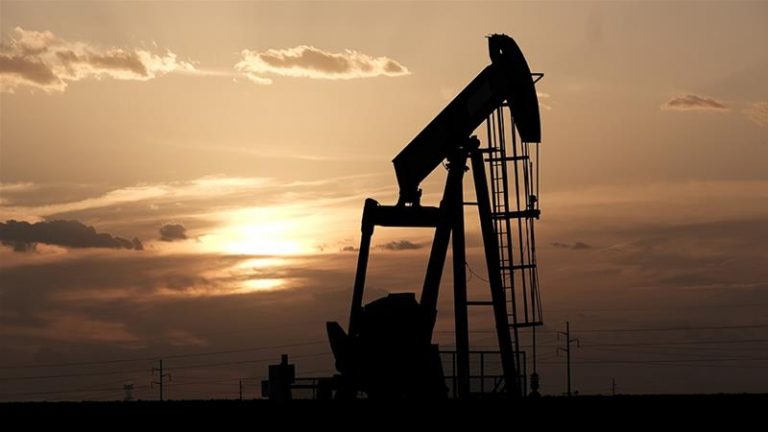Oil prices have slumped to their lowest for two decades as doubts grew about Donald Trump’s hopes of ending the US lockdown and investors braced for a week of potentially damaging figures about the impact of the coronavirus on the world economy.

The price of US crude oil plunged almost 20%, to below $15, in early trading on Monday – its lowest point since 1999 – as stockpiles continued to build owing to a crash in demand caused by the Covid-19 pandemic.
Concerns have been heightened by the growing standoff between the US president and state governors over whether the US can begin to lift restrictions on movement and businesses.
It came as the heads of all the UN’s major agencies issued a graphic warning of the risk of coronavirus to the world’s most vulnerable countries after disclosing that international donors had pledged only around a quarter of the $2bn the UN requested for its emergency Covid-19 response in March.
At a daily media briefing that grew increasingly tetchy, Trump said on Sunday night that 4.18 million Americans had been tested for the coronavirus and that the widespread operation was paving the way for parts of the country to reopen for business. “That’s a record anywhere in the world,” he claimed.
But governors accused the president of being “delusional” and said they could not embark on Trump’s recommended three-phrase programme to ease stay-at-home restrictions because the testing regime was still not good enough.
Virginia’s governor, Ralph Northam, a Democrat, told CNN’s State of the Union he had been “fighting” for testing. “For the national level to say that we have what we need, and really to have no guidance to the state levels, is just irresponsible, because we’re not there yet.”
Maryland’s Republican governor, Larry Hogan, agreed and said it was “absolutely false” to say that governors had enough testing capacity.
Despite the huge fall in the oil price – seen as a barometer of the prospects for the global economy – there were signs from other parts of the world that economies could soon begin getting back to normal.
In Germany, smaller shops were set to reopen on Monday for the first time in a month after politicians declared the coronavirus “under control”. From florists to fashion stores, the majority of shops smaller than 800 square metres (8,600 square feet) will be allowed to welcome customers again, in a first wave of relaxations to strict curbs on public life introduced last month.
Chancellor Angela Merkel and regional state premiers announced the decision to reopen last week, though they have been careful to cast it as no more than a cautious first step.
On the other side of the world, New Zealand prime minister Jacinda Ardern said the country’s stringent lockdown would be eased next Monday barring any major upsets.
She said the measures had “stopped a wave of devastation” but even under the revised regime, most New Zealanders would still be required to stay at home most of the time. Meal deliveries would be permitted and shops would be allowed to re-open providing they only sell goods online.
In Australia, some beaches in Sydney were reopened in a sign that the country was moving towards normalising daily life. The government wants at least 40% of the population to download a tracing app on their phones to help track cases of the disease before lockdown curbs are eased.
In other global developments:
- There have now been more than 2.4 million confirmed cases and 165,000 deaths from Covid-19 worldwide. The news came as US deaths passed 40,000 on Sunday – nearly a quarter of the global total – with infections at just under 760,000, or just under a third of the world’s total.
- The lack of protective personal equipment for health service workers in the UK intensified after it emerged that 400,000 gowns ordered from Turkey did not arrive as planned on Sunday. The British government has been widely criticised for failing to ensure that NHS staff have enough proper equipment to protect themselves from contracting Covid-19, along with other shortcomings in its virus response. The UK has more than 121,000 cases and 16,000 deaths.
- France reported another 395 coronavirus deaths on Sunday as hospital admissions continued to decline. The daily death toll also fell sharply in Spain and in Italy the official daily toll from coronavirus edged down to 433 on Sunday, the lowest figure in one week.
- South Korea reported fewer than 20 new cases of the virus for the third day in a row. On Monday it announced 13 new infections, bringing the nation’s total infections to 10,674. For the third day running, no deaths were reported in China.
- A Japanese expert in infectious diseases, Kentaro Iwata, a professor at Kobe University Hospital, said he was pessimistic about the country’s prospects of holding the Olympic Games despite their postponement until next year. Meanwhile, the country’s trade surplus dropped 99% in March thanks to the impact of the virus on its large export sector.
- The world’s top male tennis player, Novak Djokovic, has admitted that his opposition to vaccinations might prevent him from rejoining the tour.